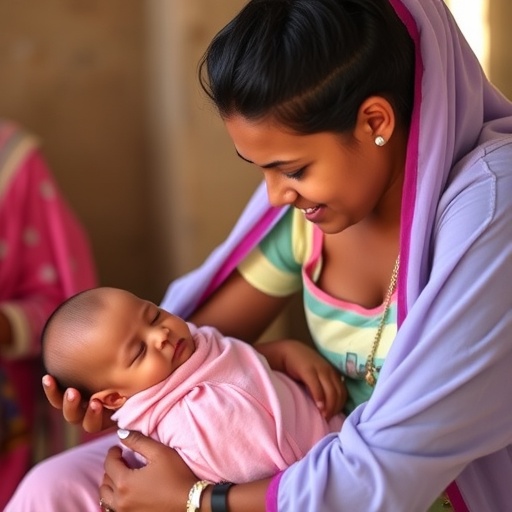Preterm birth, defined as birth that occurs before 37 weeks of gestation, remains a global health challenge, particularly in resource-limited settings. The World Health Organization indicates that between 5-20% of all deliveries are preterm, with significant variations based on geographical and socioeconomic factors. In these low-resource environments, the causes and determinants of preterm birth are multifaceted and highly complex, often involving interrelated biological, environmental, and socioeconomic conditions. The implications of preterm birth are profound, extending to increased neonatal morbidity and mortality, long-term developmental impairments, and emotional and economic stress on families.
Recent research spearheaded by Gemechu et al. sheds light on the driving factors behind preterm birth in these vulnerable populations. Their study critically assesses various determinants that contribute to the occurrence of preterm births, advocating for improved maternal and neonatal healthcare policies in resource-limited settings. The findings are not only significant but aim to create awareness and stimulate discussions among health practitioners and policymakers globally regarding the urgent need for effective interventions.
In their comprehensive analysis, Gemechu and colleagues utilized a robust methodological framework that included both quantitative and qualitative data collection methods. This dual approach permitted a deeper exploration of the experiences and challenges faced by families, healthcare workers, and communities in these contexts. In particular, the research focused on specific risk factors including maternal age, nutrition, access to healthcare, and the impact of socioeconomic status, which are significantly associated with preterm deliveries.
Risk factors such as advanced maternal age and young maternal age were highlighted in their findings as crucial determinants. Older mothers may have pre-existing health conditions that complicate pregnancies, while younger mothers often have less access to reproductive health information and services. Furthermore, inadequate nutrition during pregnancy remains a pressing concern in resource-limited settings, where food insecurity is prevalent. Nutritional deficiencies can lead to complications, ultimately resulting in preterm births.
Access to quality healthcare services emerged as a critical theme in the research. Many women in resource-limited settings may not seek prenatal care due to financial barriers, transportation issues, or lack of awareness regarding the importance of attending healthcare clinics before and during pregnancy. This gap in healthcare access signifies a pressing need for community-based interventions and educational programs to empower women and ensure they receive appropriate prenatal and postnatal care.
Scientists from various fields have long recognized the role of environmental and sociocultural factors in influencing maternal health. Gemechu et al. emphasize how such factors can contribute significantly to the incidence of preterm birth. Experiences of violence, stress, and inadequate support systems have emerged as additional barriers that can harm pregnant women’s health and well-being. Addressing these sociocultural influences through community engagement and education is imperative for reducing the incidence of preterm births.
In addition to these determinants, the research team explored the interplay between social determinants of health, such as income level and education, and preterm birth rates. The study’s results revealed a clear correlation: women with lower education levels and income are significantly more likely to experience preterm births. Thus, promoting educational access and economic empowerment for women can be considered a viable strategy to diminish the risk of preterm deliveries.
Techniques used to mitigate preterm births include increased dissemination of information on maternal health, improved access to contraception, and family planning services. By educating communities, families can make informed reproductive health choices and better prepare for healthy pregnancies. The findings of the research advocate for an integrated approach that combines medical interventions with public health campaigns to promote maternal health literacy.
Furthermore, the researchers call for the integration of mental health services into maternal healthcare systems. The evidence suggests that maternal mental health is closely linked to pregnancy outcomes, including preterm birth. Providing women with mental health resources and support can not only improve their well-being but may directly reduce the rates of preterm births.
The implications of the findings are substantial, with calls for policymakers to prioritize investments in maternal and neonatal health programs, particularly in low-resource settings. By adopting evidence-based interventions tailored to the local context, nations can enhance the health outcomes of mothers and newborns alike. Moreover, efforts should extend beyond temporary measures, emphasizing the sustainability of programs that promote long-term health improvements.
In conclusion, the exploration of preterm birth determinants in resource-limited settings offers crucial insights that are pivotal for public health strategies aimed at mitigating this global concern. The findings from Gemechu et al. serve as a clarion call to stakeholders in maternal and child health to improve the health systems that care for vulnerable populations. Ultimately, the aim is to ensure that every woman has the opportunity to experience a healthy pregnancy, thereby giving birth to a healthy child.
As the scientific community continues to delve into the complexities surrounding preterm births, it is hoped that research such as this will inform future studies and interventions. Addressing the multifaceted factors associated with preterm birth not only involves understanding biological mechanisms but also necessitates tackling social inequalities and enhancing healthcare accessibility. In doing so, we safeguard the health of future generations and foster a healthier global society.
Subject of Research: Determinants of preterm birth among newborns in resource-limited settings.
Article Title: Determinants of preterm birth among newborns in resource limited settings.
Article References:
Gemechu, T., Golicha, W., Jara, B.A. et al. Determinants of preterm birth among newborns in resource limited settings.
Sci Rep 15, 37564 (2025). https://doi.org/10.1038/s41598-025-09455-4
Image Credits: AI Generated
DOI: 10.1038/s41598-025-09455-4
Keywords: Preterm birth, maternal health, resource-limited settings, socioeconomic factors, healthcare access.




